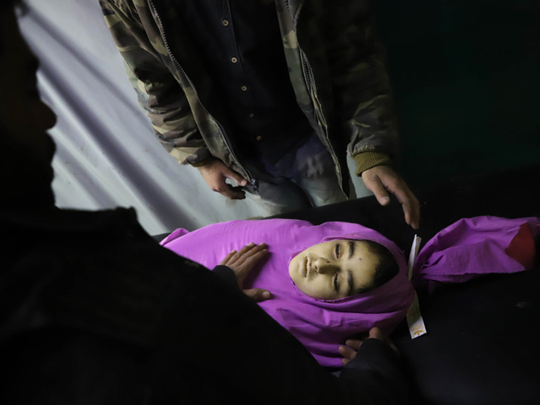
Beirut: Syrian President Bashar Al Assad is poised for another crushing military victory over his opponents, defying the United Nations, the Trump administration and the appeals of the international community by pressing ahead with one of the bloodiest offensives of the Syria war.
The death toll is surging as the Syrian army and its Russian and militia allies seek to overrun the Damascus suburb of Eastern Ghouta, the largest remaining rebel stronghold in the vicinity of the capital.
Warplanes are carrying out round-the-clock bombardment of the densely populated cluster of towns and villages that rose up against Al Assad in 2011 and have been cut off from the outside world since 2013.
Government forces have recaptured around half of the area, and it now seems only a matter of time before Eastern Ghouta joins the list of locations clawed back from rebel control - by brute force, negotiated cease-fire or a mixture of the two.
Doctors in Eastern Ghouta published photographs Tuesday of children they said had been burned by napalm. Chlorine bombs also have allegedly been dropped, despite warnings from senior US officials that the use of chemical weapons might draw a military response.
The allegations can’t be proved because Eastern Ghouta is inaccessible.
But “even if we cannot verify them, we cannot ignore them,” UN Secretary General Antonio Guterres told the UN Security Council on Monday.
“Syria is bleeding inside and out,” he said.
The violence comes despite a UN Security Council-mandated cease-fire that was to take effect over two weeks ago but instead seemed only to accelerate the killing. The Eastern Ghouta health authorities estimated Tuesday that more than 1,400 people have been killed since the Feb. 18 assault on the enclave began, with 840 of those deaths occurring since the Security Council adopted a 30-day cease-fire Feb. 24.
Addressing the Security Council on Monday, US Ambassador Nikki Haley said the United States is prepared to act unilaterally to enforce the cease-fire if Russia does not comply.
Given its large population and distance from international borders and rebel-held territory to which the fighters and residents might easily escape, the only identifiable outcome seems to be outright military victory by the government.
The Al Assad government’s pursuit of a military solution over a negotiated settlement to the fighting “precludes any other option,” Sajjad Malik, the UN High Commissioner for Refugees representative in Damascus, said in an interview last week.
“And it’s really dramatic for the people. We’re seeing this played out in Ghouta as never before.”
A week ago, Malik accompanied the only convoy of aid to be allowed into Eastern Ghouta since November and said he was shocked by what he saw. Most people have spent the past three weeks hiding in basements and crudely built underground shelters, where conditions are rapidly deteriorating.
“There’s not enough food. There’s not enough medicines. There’s skin rashes because they haven’t washed in days. These people want either to stop the bombing or get out,” said Malik, who spent seven hours in Eastern Ghouta. What he saw, he said, “will stay with me forever.”
“The children are filled with trauma - you can see it in their eyes. They’re tired. They’re hungry,” he said.
As loyalist forces retake territory, civilians are being squeezed into an ever-smaller space. About 10,000 to 15,000 people are on the run, and local authorities say displaced people are camped out on the streets and in parks in the town of Douma, the area’s largest metropolis, because they have no other place to go.
In the basements and shelters, the question of whether to leave or to stay is a subject of debate.
Some residents want safe passage out. Others would prefer a deal such as the one that ended the siege of Aleppo in 2016, with fighters evacuated along with any residents who wanted to depart, leaving the area under regime control.
“Our leaving the city needs assurances from the UN that the regime will not put us in detention and torture us. Russia is not enough to give these guarantees because they are a partner of the regime in killing our people,” Naamat, who would like to leave, said from the basement she has shared with 320 people from her area for the past three weeks.











